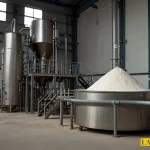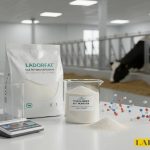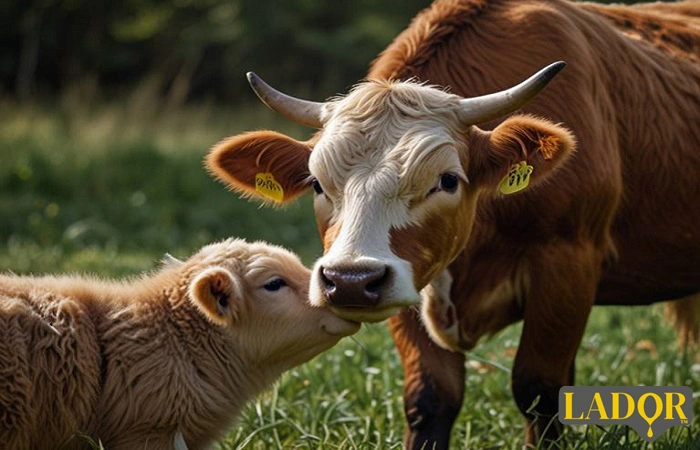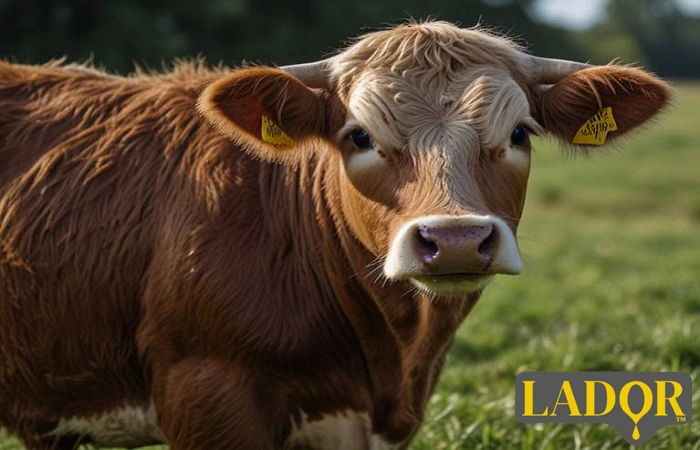

Appropriate feed for fattening calves is always presented as one of the most significant challenges in the livestock industry. This is because the sectors related to supplying the community’s required animal protein hold special economic importance. The main goal in this process is to bring the calf to its maximum final weight and produce quality meat in the shortest possible time and at the most optimal cost. Stay with us to talk more about this topic.
Success in fattening heavily relies on proper management, selecting the appropriate breed, and, most importantly, formulating a scientific, balanced, and high-energy diet. Approximately 60 to 70 percent of a livestock unit’s operating costs are related to animal feed, making knowledge of the best food sources and additives for the rapid and healthy fattening of calves essential. Join us as we examine the required feed for calf fattening.
The feed for fattening calves must be based on providing sufficient energy, protein, vitamins, and minerals to cover the animal’s needs for rapid bone and muscle growth and Average Daily Gain (ADG). The desired ADG in fattening calves is usually between 1000 to 1800 grams.
Energy is the key component for weight gain and fattening calves. The major energy sources include:
Grains: Corn (as the main starchy and energy source), barley, and wheat (in controlled amounts). High grain consumption must be carefully managed to prevent digestive problems like acidosis.
Beet Pulp: A suitable source of energy and digestible fiber.
Molasses: A good source of energy due to its palatability, which can increase feed intake.
Fat Powder: Fat sources such as animal and vegetable fat powders (especially rumen-protected fats) play a vital role in enriching the diet for rapid fattening due to their high energy density and can be added to the diet during the final finishing periods.
Protein is essential for the growth of muscles and vital organs. The need for protein is higher in the initial phase (younger calves). Important protein sources include:
Meals/Cakes: Soybean meal (the best protein source), cottonseed meal, rapeseed (canola) meal.
Alfalfa: Quality alfalfa is an important part of the diet due to its quality protein and fiber.
Forage plays a fundamental role in maintaining rumen health and preventing acidosis. A proper balance between forage and concentrate is crucial.
Dry Alfalfa: High-quality forage.
Straw: A cheaper source of fiber.
Corn Silage: A good source of digestible energy and fiber.
Vitamin and Mineral Supplements: Supplying essential micronutrients like calcium, phosphorus, iron, and fat-soluble vitamins (A, D, E).
Buffers: Such as baking soda (sodium bicarbonate), for regulating rumen pH and preventing acidosis (especially in high-grain diets).
Probiotics and Prebiotics: For improving digestive tract function and rumen health.
Antibiotics and Coccidiostats (in consultation with a veterinarian): For disease control and increasing feed efficiency.

The fattening calf’s nutrition is divided into two or three main stages, where the nutritional requirements (especially the protein-to-energy ratio) differ in each stage:
Growth Focus: The focus during this period is on skeletal and muscle development of the calf.
Protein Requirement: High (approximately 16 to 18% Crude Protein). This protein is vital for building new muscle tissues. Key sources are soybean meal, cottonseed meal, and high-quality alfalfa (lucerne).
Forage-to-Concentrate Ratio: Relatively higher (40 to 50% forage and 50 to 60% concentrate). Sufficient fiber is essential for the proper development and function of the rumen.
Expected Daily Weight Gain: Approximately 1 to 1.2 kg.
Growth Focus: The goal of this period is maximum weight gain and subcutaneous fat deposition to improve carcass quality.
Energy Requirement: Very high. For this purpose, the share of grains (corn/maize and barley) increases.
Protein Requirement: Decreases (approximately 14 to 16% Crude Protein). A smaller portion of growth is dedicated to protein synthesis.
Concentrate-to-Forage Ratio: Shifts towards concentrate (70 to 90% concentrate and 10 to 30% forage). Reduced fiber increases energy density and lowers the feed conversion ratio (FCR).
Energy-Enhancing Additives: The use of pure fat sources (such as rumen-protected/bypass fat powder) is crucial to increase the diet’s energy density without adding extra starch, which can lead to acidosis.
Expected Daily Weight Gain: More than 1.3 to 1.8 kg.

The use of edible fats in the fattening calf’s ration is the fastest way to raise the diet’s energy level and consequently increase weight, due to their high energy density (approximately 2.25 times that of carbohydrates).
Energy Without Acidosis:
Unlike grains, which can cause acid production and acidosis when the dose is increased, fats provide high energy without reducing the rumen’s pH.
Increased Density:
It allows the animal to receive more energy despite limitations in daily feed intake.
Bypass Fat Powder:
Products like calcium salts of fatty acids or palm oil-based fats are processed in a way that they are not digested in the rumen and pass directly to the small intestine (Bypass Fat). This feature helps maintain rumen health and also ensures that fiber digestion in the rumen is not disrupted.
Aala oil Sepahan Company, operating under the commercial brand Lador, is a leading producer in the field of supplying raw materials and additives for livestock, poultry feed, and related industries.
Utilizing modern technologies and an experienced scientific team, Ladorfat produces high-quality products that meet global standards, helping farmers improve their livestock’s production performance and health.
The products of this company include poultry oil, animal oil, omega 3 fat powder, as well as raw materials and additives for the preparation of animal and poultry feed, including; feed for fattening livestock and dairy, dairy cow feed, horse feed, turkey, quail, beef and countless other products.
Calf fattening nutrition is a scientific and sensitive process whose success requires a precise balance of energy, protein, and fiber. To achieve maximum daily weight gain, the use of high-energy-density diets is essential. For more information and to know the price, contact our experts in Ladorfat.